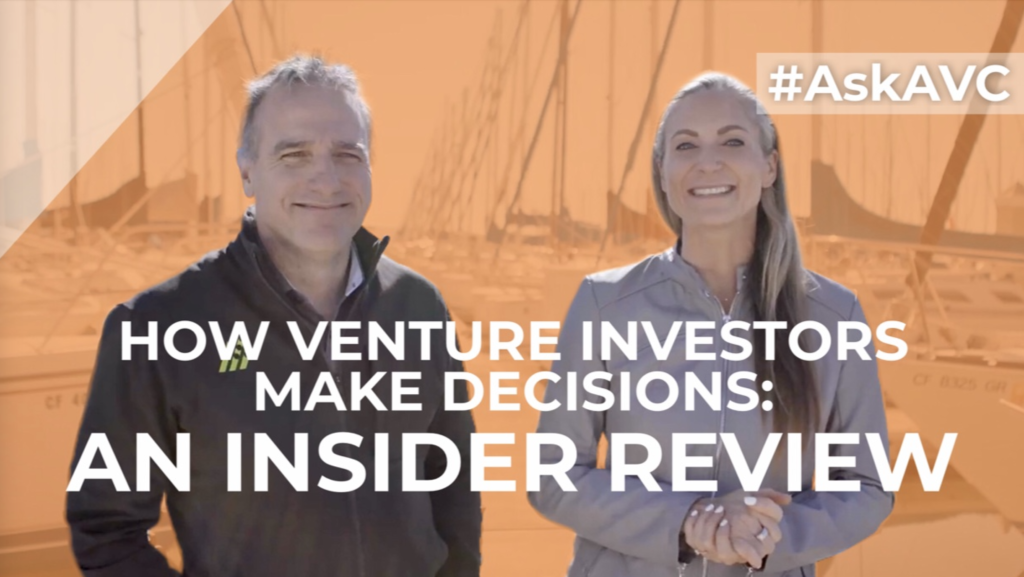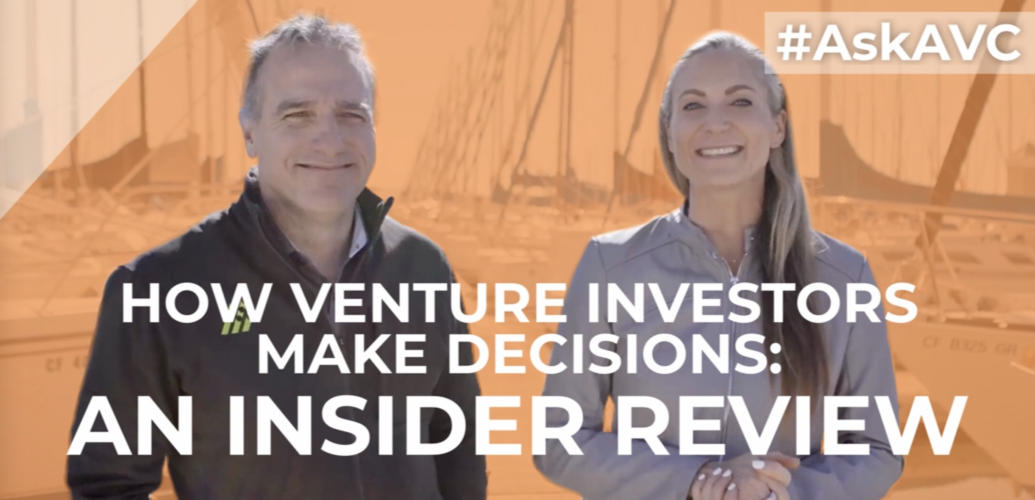Storm Ventures invests in SaaS companies that are just starting to emerge from product market fit, and we help them to figure out their go-to market motion.
As investors, we are often asked about what the VC decision process is. So I teamed up with Pascale Diaine, a fellow partner at Storm Ventures who joined us five years ago, to pull back the curtain on how we work and make decisions. We put together these key points, and we also made a video version here.

How long does an Investment Decision take?
A common question is the timeline for decision-making and creating term sheets. I’d love to give a crisp answer, but that’s not possible. It all depends on the individual entrepreneur, and it’s a two-way street.
I advise entrepreneurs to expect transparency. You can’t really predict exactly how long it will take. However, even if keeping a strict timeline is unrealistic, you can check in now and then and aspire to complete honesty when it comes to status or progress reports.
Do Investors need Customer References?
Founders are a little nervous about references, especially the prospect of customer calls. We only want to talk to customers to understand why they like the product and where they find the value. We keep things positive, and also try to validate outside of the firm’s customer base.
Everything we do is focused on B2B SaaS, so we know lots of people we can talk to about tech solutions in every area. So, you can expect us to talk to customers that you didn’t recommend but were included on your list, if we already know them.
It’s important for us to understand the value they derive from your product, the use cases, and ROI. That’s really what’s going to determine the future of the company.
Getting hold of people we already know saves you from having to burn equity to make the necessary introductions.
Will Investors want to Call Your Customers?
If a venture investor asks you for a customer list straight after your first meeting, you should run in the opposite direction. It’s not relevant at that stage. There is so much work that needs to be done to prepare for those calls and make them meaningful.
Usually, there’s nothing nefarious about an investor’s eagerness to secure references.
However, venture capital firms typically shouldn’t put the burden on your customers to teach them about the business: that’s something we, as investors, need to figure out on our own.
What Happens After the First Investor Meeting?
Investors usually ask for high-level financials, as we strive to understand the direction of your company. If we are excited by what we find, then we talk to an expert in our own network who knows the space better than we do. After that, we get the entrepreneur to talk to the partnership. Of course, the VCs are not making decisions on their own. In the case of Storm Ventures, we are a team of five.
If the individual VC has already pitched you to the rest of the company, that shows that we believe in what you’re doing – but now it’s your turn to engage. Often, it’s hard to get a term sheet without moving through that process.
Remember that investors are financially minded. Storm invests in growing companies that have $500,000 to $1m of ARR, and that’s a baseline expectation for us, which is why it’s a good idea to put together a detailed set of financials and include them in your deck. It’s a quick way to get investors excited.
If they only have an hour to spare, it really helps to cut to the chase. Learning about the expectations of the partnership is part of the coaching process.
Voting and Making Decisions in a VC firm
Most of the time, you already know what kind of pushback you can expect from the partnership. We help to cover each other’s blind spots, and that’s part of the reason why these partnerships work so well. However, we don’t make unanimous investment decisions.
As a relatively small firm (Storm closed its Fund VII in March with $200m in capital), there is no voting system. Conveniently, smaller investment teams make faster decisions.
There is an absence of internal politics and we don’t have complex decision-making mechanisms to get in the way. As a partner, you’re constantly getting challenged. That’s the way it should be, as all partners are held accountable under this approach.
From the entrepreneur/founder perspective, it’s important to realize that whoever writes the check is your champion! They’ll be your representative within the larger partnership. I don’t know any firm that makes group decisions, as it usually leads to bad investment outcomes.
Founder Reference Calls
These are usually about understanding the founder as an individual. We want to know what drives you, how you react in a team, how approachable you are, and to get a feeling for your management style. Do you take advice, and do you have an open mind?
At the seed stage, investors are willing to take a lot more risk. Founder references may be harder to get. If you haven’t been a CEO before, that’s not a requirement for raising money. However, as you approach the A or B round, the situation begins to change.
You’re entering a new phase, and references become more important. Investors want to have confidence in your ability to scale, and in the evolution of your business culture.
Some investors are more prescriptive, others are more consultative. Some have lots of domain expertise, while others are more financially minded. All of those styles can work. It’s really a question of what you’re most comfortable with.
It’s critical to get the chemistry right if you’re planning to work with an investor for a long time. That’s why the team at Storm Ventures makes a point of adapting to the founder or entrepreneur.
How we make a Startup Valuation
We need to know your last valuation and what the cap table looks like. After all, we want the deal to work for everyone. Often the cap table and ownership are wildly skewed. For example, if a departed founder owns half the shares, that could throw up some challenges.
Our focus on valuations in subsequent rounds and how to generate investment return is not about trying to take advantage. It’s just part of evaluating the opportunity. Whatever money we invest, it’s likely that you’ll be able to raise two to three times that amount.
It’s critical to have transparency on the numbers with our founders. If you’re valued too high, it will be difficult to grow into that valuation over time. No one wants to take a down round. Eventually, valuation becomes a negotiation — one of the few occasions where we’re on the other side of the table from the founder.
When founders aren’t forthcoming, it makes the VC firm less confident about what will work and how we can help. Excessively high valuation numbers make it hard for the entire partnership to get on board.
Bear in mind that it’s not personal if we don’t see eye-to-eye with founders on the valuation. The mere fact that we’ve reached the point of discussing valuation shows that we are serious about investing in the company.
When everyone is comfortable, we send over a term sheet — essentially a simple business agreement. Then we have a handshake on getting the deal closed.
Ryan Floyd is a founding Managing Director of Storm Ventures, where he invests in and works with early-stage enterprise SaaS startups.
Pascale Diaine joined Storm Ventures in 2017. She previously invested in companies like Sendoso, German Bionic, InEvent, and Talkdesk.
